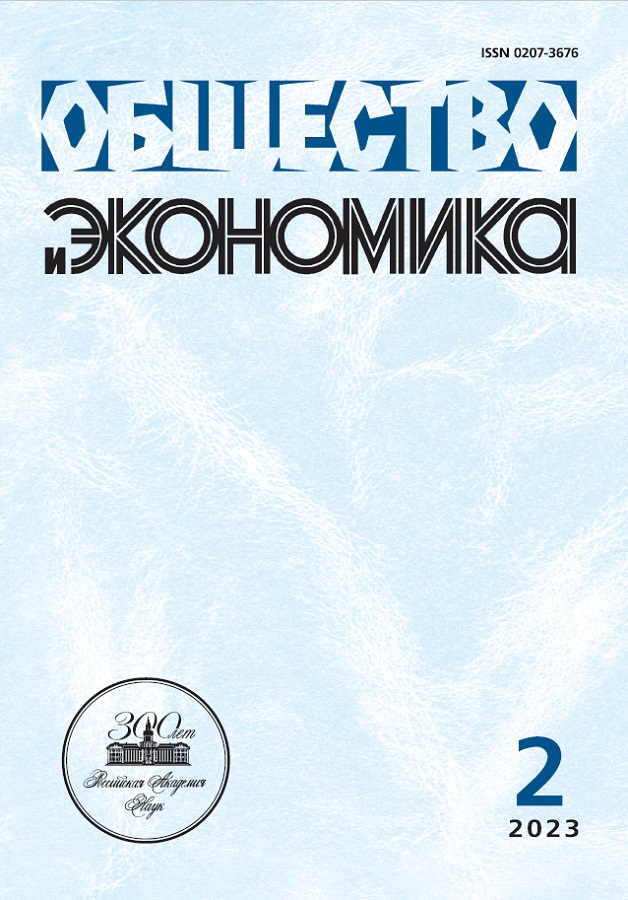Cheap Labor And Economic Growth: Trends Of The Russian Labor Market In The Context Of The Smo In Ukraine
- Authors: Sedlov A.1
-
Affiliations:
- Institute of Economics of the Russian Academy of Sciences (RAS)
- Issue: No 2 (2023)
- Pages: 45-60
- Section: Articles
- URL: https://freezetech.ru/0207-3676/article/view/671797
- DOI: https://doi.org/10.31857/S020736760024280-7
- ID: 671797
Cite item
Abstract
The contraction of the Russian labor market as a result of the outflow of foreign labor during the pandemic was replaced by its recovery and subsequent growth. The development of the Special military operation (SMO) in Ukraine reduced the supply on the Russian labor market and increased the demand for domestic workers. Multidirectional vectors of labor supply in the market are considered in the work in the context of assessing the impact of cheap labor of migrants from the CIS countries on economic growth. Systemic reasons for the technical backwardness of underestimated sectors of the economy, which are an adequate environment for cheap labor, are qualified; the characteristics and directions of the influence of the labor market with low incomes on the innovative development of the economy are given
Keywords
Full Text
About the authors
Aleksey Sedlov
Institute of Economics of the Russian Academy of Sciences (RAS)
Author for correspondence.
Email: socpol@mail.ru
Russian Federation, Moscow
References
- Novyj ehntsiklopedicheskij slovar' / Pod obsch. red. akad. K. K. Arsen'eva // SPb.: Izd-vo F. A. Brokgauz i I. A. Efron. 1914. T. 18. S. 491.
- Glaz'ev S.Yu. Ryvok v buduschee. Rossiya v novykh tekhnologicheskikh i mirokhozyajstvennom uklade //M. Knizhnyj mir. 2018.
- Denisenko M.B., Chernina E.M. Trudovaya migratsiya i zarabotki migrantov v Rossii. // Voprosy ehkonomiki. 2017; (3):40-57.
- Komarovskij V.V. Migratsionnoe regulirovanie v period pandemii COVID-19// M. 2020. Ezhegodnik Vostok-Zapad-Rossiya. IMEhMO RAN. C. 47-53.
- Kapustin E.I. Trudovye resursy SSSR // L., 1981.
- Kubishin E.S., Sedlov A.P., Soboleva I.V. Problema bednosti v Rossijskoj Federatsii v sotsial'no-professional'nom i regional'nom aspektakh v usloviyakh pandemii // Obschestvo i ehkonomika. 2021. № 3. C. 64-77.
- Sedlov A.P. Deformatsii rossijskogo rynka trud v kontekste ispol'zovaniya deshevoj inostrannoj rabochej sily: reimmigratsiya i trudovye standarty //Obschestvo i ehkonomika. 2021. № 9. C. 91-106.
- Sedlov A.P. Vliyanie pandemii COVID-19 na formirovanie rynkov truda Rossii i stran ES // Vestnik instituta ehkonomiki RAN. 2022. № 2. C. 24.
- Yakovleva E.B. Zapadnye teorii vneshnej trudovoj migratsii (kriticheskij analiz na osnov evropejskikh i rossijskikh realij) // Problemy sovremennoj ehkonomiki. 2017. №1(61). S. 69. URL: http://www.m-economy.ru/art.php?nArtId=5982
- Lee E.S. A Theory of Migration // Demography. 1966. No 3 (1).
- Lewis W.A. The Theory of Economic Growth // N.Y. 1959. P. 402.
- Piore M. Birds of passage. Migrant labor and industrial societies // New York: Cambridge University Press. 1979.
- Sassen S. The Mobility of Labor and Capital: A Study in International Investment and Labor Flow // New York : Cambridge University Press. 1988. P. 240.
- Wallerstein I. The Modern World-System / Vol. III: The Second Great Expansion of the Capitalist World-Economy, 1730–1840’s.// San Diego: Academic Press. 1989; The Modern World System I. Capitalist Agriculture and the Origins of the European World Economy in the Sixteenth Century. // New-York. Academic Press. 1974. P. 410.
- Trud i kachestvo zhizni naseleniya Rossii (k 100-letiyu so dnya rozhdeniya E.I. Kapustina) / Sbornik. Otv. red. I.V. Soboleva // M., IEh RAN. 2021. - 280 s.
Supplementary files











